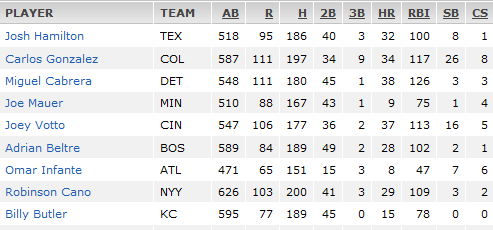Metadata is fundamental to the organization of all types of information: attributes such as title, creator and topic help us identify different works as well as locate and access them through information retrieval tools such as a search engine or library catalog.
Although it’s commonly boiled down to a simple definition of “data about data,” metadata is actually quite a complicated concept, although its various categories can all be described as “structured information that describes the attributes of information resources for the purposes of identification, discovery, selection, use, access and management.” (Taylor and Joudrey)
As such, metadata is a very important topic for librarians, webmasters and others working with different types of digital data.
But what about other people, say, baseball fans?

Metadata
I recently read a chapter in a Library Technology Report called “Understanding the Semantic Web: Bibliographic Data and Metadata,” which made some interesting points about metadata.
In it, author Karen Coyle explains how metadata is also used as a substitute for things that would otherwise be impossible to represent. In particular, she gives the example of baseball, describing how we take a game and reduce it to a bunch of statistics from which we can make conclusions such as who is the most powerful hitter or most skilled pitcher.
Coyle says that for many enthusiasts of the game, “this seemingly abstract reduction of the game to fractions and percentages can be every bit as real as the game itself.”
I would argue that for the millions who obsess over their fantasy players and standings, it is actually much more real than the actual game!
Many others, including loyal fans and sportswriters, have been critical of fantasy sports, arguing that “the reduction of sports to abstract metadata is entirely inappropriate!” (Okay, I might be doing a bit of translation here.)



Leave a Reply